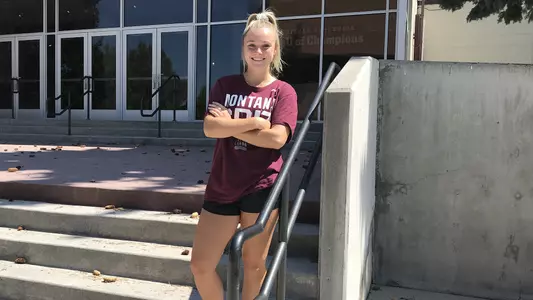
The Craig Hall Chronicles :: Jaden Griggs
8/9/2019 4:26:00 PM | Soccer
This story begins on the road, specifically U.S. Highway 2 in central Washington, as it makes its way north from Wenatchee, hugging the Columbia River, which flows outside the driver's-side window, north to south, on its way to the Pacific.
In Orondo, Highway 2 takes a hard right and points east, leaving northbound travelers on Highway 97, where the road starts getting pressed hard on both sides by fruit orchards.
Orondo Elementary, where Jaden Griggs attended school through the fourth grade, is on the left, its multi-use athletic field one of the only green spaces in the fertile valley not dedicated to the growing of fruit.
As the road continues north, a big, red barn emerges, which means it's time to look for Griggs Lane, where we'll want to take a left and drive a few hundred feet toward the Columbia, motoring, naturally, through more orchards as we search for the family home, hidden as it is between the fruit and the river.
That the Griggs family lives on Griggs Lane should come as no surprise. You'll probably agree they've earned some naming rights after all these years of caring for the land. And you'll likely agree they are probably worthy of more than that given what the family has meant to the region over the years.
You see, the family first arrived on what they consider this sacred spot in '84. That is 1884, when the Fishers, by way of Norway, homesteaded a chunk of land and built Douglas County's first wood-framed home. And later -- and most fortuitously -- gave the growing of soft fruit trees a go.
Those were John Griggs' great-great-grandparents. One hundred thirty-five years later, Jaden Griggs' dad oversees a property of maybe 1,000 acres, nearly half of which is used to grow fruit.
To put all that in perspective: This year the family decided to take out some old cherry trees that had quit producing fruit and replaced them with new trees. The old ones were more than 100 years old. They had been planted by someone earlier up the bloodline, cherry trees connecting generations.
If you were tasked with designing the world's most perfect place to grow cherries and other fruit -- down to terrain, climate and elevation -- you would find yourself describing in perfect detail the Orondo Valley and its micro-climate.
It's warm and sunny but that is balanced by the cool air that comes off the Columbia. The valley is sheltered from heavy winds, which keeps the fruit from getting marked up and damaged. All of it combines to produce some of the first fruit to market, in a business when timing can mean everything.
Each year Griggs Farms, more formally known as G&C Farms, produces three million pounds of cherries, which are picked in June and July by more than 200 seasonal employees, plus another 6,000 bins of apples and 1,500 bins of pears.
John is the one we've come to see today on our drive, but we should have called ahead to check on his schedule. Turns out he left early this morning, bound for Taiwan.
Three-quarters of that annual produce is sent by plane and container ship to Asia, where it will largely be sold in Taiwan, Hong Kong and China, where the fruit is an exotic, high-quality delicacy and draws the best price. The rest is sold domestically.
Griggs started making the trip at this time of year with his own dad, when he was a kid, meeting with the buyers -- the same ones he works with today -- making sure the fruit arrived undamaged, ensuring everyone is happy.
It's a personal approach that has paid off.
It was about this time last year that Jaden Griggs and her mom, Mauri, arrived in Missoula. She'd been emailing new Montana soccer coach Chris Citowicki for weeks. Here is when and where I'll be playing. Please come check me out!
Now she was on campus, but it was during the team's preseason, and the coach could rarely be found in his office. So she went home to Washington, but not before penning a quick note to the man she hoped could be her future coach.
The personal approach paid off.
"That made an instant impression on me," says Citowicki. "She's one of the few people who has ever left a hand-written note.
"It made me a bit more willing to watch some of her film and dig into finding out who this kid is. The more I watched her film and got to know her, the more I liked her."
Who this kid is? She's a product of her upbringing, an extension of her environment. It shouldn't come as a shock that her first memory of work, of putting those stickers on peach boxes for hours on end, every day, inside that old, red barn, predates her first memory of soccer.
It just so happened, by the forces of nature and the local school district, that the start of her -- and her brother, John Jr.'s -- summer vacation coincided with the start of the farm's harvest.
They can put it on the calendar: cherry harvest starts around June 5 and, because the farm has different varieties with different growing periods, extends until July 19. The other fruits have their own harvesting schedules.
It's a time when things have to happen, when no one can stand idly by, looking on, sitting inside watching television, playing on the Columbia, as enticing as that might be in the heat of summer. It's an all-hands-on-deck approach, as it has been for generations. Even for the youngest of the family.
"Our kids understood that summer is when we make our hay, so to speak," says John. "This is how we make our living, from June to November. The kids were expected to work and help out.
"We grew a lot of peaches, and that was a big job for Jaden every day, putting stickers on peach boxes as we were packing them in the barn."
She didn't resist the work. She loved it. "That's my first memory. I thought it was so cool I could help out. I grew up in that barn."
Mauri, a registered nurse, married into the family and its business. But she added something as well. It was her athletic genes, mixed in with some hard-working Griggs DNA, that expressed themselves in their daughter.
Playing for Wenatchee High, 30 minutes away from Griggs Lane, she was first-team all-league as a sophomore, junior and senior, the Columbia Basin Big 9 Player of the Year as a junior, when she broke the school's single-season scoring record.
She also tore up the track, preferring the relays over the open sprints, team over individual (always has been for her, always will be), another manifestation of the togetherness she came to value from her work on the farm, where the operation needs all the moving parts operating in solidarity.
But it was on the soccer field where she stood out the most, a pest for opposing defenses with her speed and her knack for getting the ball to the net.
"She'll take you on and beat you 1-v-1. She has the attitude that I want with a player who plays in the wide position, with the speed as well," says Citowicki.
"She's not the biggest physique, but she's athletic and has the speed. She has a big upside to her. She's scoring now on athleticism. You teach her the tactical aspect, you put her in the right spots and all of a sudden you're sitting on a goldmine."
Aided by a local coach with connections to the state of Florida, it was Nova Southeastern, a Division II school near Miami, that first wooed Griggs.
It was a heady time for everyone, Griggs, her parents, her coaches. When it wore off, though, the geographic reality set in. And the historic anomaly of the offer.
The family has lived in the same area for more than a century, its roots having grown deep. Indeed: on Griggs Lane also reside her grandpa and her grandpa's sister. It's a close-knit family in more ways than one.
Nova Southeastern? Its campus sits more than 3,000 miles away from Orondo.
"I was excited at first, then I really started to get nervous," says John. "You want the best for your daughter, but we're a pretty tight family. You kind of want your kid to be halfway close to home."
Daughter came to the same realization over time, which had her looking at something relatively closer to home. Other teams from the Big Sky Conference, located nearer to Orondo than Missoula, were interested, but they weren't Montana.
Like Sydney Haustein in the previous Craig Hall Chronicles article, who said, "I was just waiting to be wowed by a school. And I wasn't until I came on this campus," Griggs just had to make a visit.
"When I came here, I fell in love with the campus," says Griggs, who played her final years of club soccer with the Issaquah Gunners, near Seattle. One of her former teammates was Brooke Johnston, who was one year older than Griggs and already a Grizzly.
"I was like, I could possibly play soccer here, so I want to get the coach's attention. Really bad."
She started the email campaign, not asking for a spot on the team, simply asking Montana's new coach to check her out, either on video or in person.
But so were hundreds of other recruits who just wanted to be seen, just wanted to be noticed, just wanted to stand out.
So she took it one step further. She paid a visit to campus, hoping for a sit-down. But she arrived at one of the busiest times of the year: preseason, in Citowicki's first season, with multiple training sessions each day, team meetings, team meals. His office remained dark.
"My mom and I were like, what should we do? How about I write him a note?" Griggs says. And that set everything into motion. With a bit of ink on paper, she had separated herself from those hundreds of other players attempting to get the coach's attention.
"It all started with a note that was left behind," says Citowicki. "That's what triggered it for me. Nobody does that." Jaden does. Consider it a personal approach handed down by the generations.
Of course locking eyes across a crowded room is only the first step in the long dance of ultimately getting together.
Citowicki watched more video, talked to more coaches. Then he did something he is loath to do: he presented his Dream-Work-Achieve approach to his program over the phone, with Griggs and both of her parents listening in on the other end.
His is a way of life for a student-athlete that isn't for everyone. That's why he likes to have the player and those closest to her in his office, where he can read body language and all the signals that can't be picked up through a phone line.
Perhaps he'd discovered enough through his background checks. The Griggs? Yeah, they were made for this.
"When we first met with Chris, I just really liked how he was family-oriented and wanted to have the kids be a unit and be together," says John.
"It was kind of the same values we have. Family and closeness. It was a home run for us that she chose to go to Montana. We are very thankful she ended up going there."
When classes start later this month, she'll not just be a soccer player. She'll be a student as well, pursuing a degree in business and marketing. Because that fruit isn't going to sell itself to those international markets. Somebody is going to need to pick up the generational torch.
When John was growing up, with a brother and sister, the chain that reaches back to 1884 remained intact. His interest was in the farming operation of the business. His brother wanted to work in sales, his sister in operations, with the packing and the shipping. And it worked out. And the line remained intact.
A few years ago, Jaden wouldn't have seen it, that one day she might return to Griggs Lane and become part of the fifth generation to turn the magic of that land into a living.
John Jr., who graduated from Wenatchee Valley College's tree fruit program and is now working elsewhere in the orchard business as a way to pick up some new experiences, is in. Jaden? She's starting to lean that way if she isn't already all in on the idea.
"That would be awesome," says their dad. "That makes their mom and me really proud and happy. They would be fifth-generation, and that's pretty unheard of these days. That's pretty priceless."
Those family ties, they can be strong. Of course soccer has been a big part of Griggs' life since the age of five, so that's a passion that's deeply ingrained as well. And playing the sport, like the fruit that comes from the family farm, has a shelf life.
She is at Montana with an eye on the future while trying to get everything she can from the present.
"She's the type of player I want to work with because I see a ton of potential in her. I'm excited about her," says Citowicki. "We just have to put her in the right spot and away she'll go."
Back in the 2004 growing season, before Griggs was even four, before she'd ever kicked a soccer ball, her grandpa was out checking on the farm's Rainier cherry orchards.
One tree stood out from the rest. It had matured earlier than the others and its fruit had a new, sweeter taste. The Orondo Valley had gifted the farm a new variety. He named it the Orondo Ruby. Patented it even.
It's grown nowhere else in the world but Griggs Farms and is the perfect stepping-off point for the story of Jaden Griggs, the player no one saw coming but who used a note to insinuate herself into the picture and onto the team, separating herself from the others.
Now discovered, she's here for us all to enjoy.
In Orondo, Highway 2 takes a hard right and points east, leaving northbound travelers on Highway 97, where the road starts getting pressed hard on both sides by fruit orchards.
Orondo Elementary, where Jaden Griggs attended school through the fourth grade, is on the left, its multi-use athletic field one of the only green spaces in the fertile valley not dedicated to the growing of fruit.
As the road continues north, a big, red barn emerges, which means it's time to look for Griggs Lane, where we'll want to take a left and drive a few hundred feet toward the Columbia, motoring, naturally, through more orchards as we search for the family home, hidden as it is between the fruit and the river.
That the Griggs family lives on Griggs Lane should come as no surprise. You'll probably agree they've earned some naming rights after all these years of caring for the land. And you'll likely agree they are probably worthy of more than that given what the family has meant to the region over the years.
You see, the family first arrived on what they consider this sacred spot in '84. That is 1884, when the Fishers, by way of Norway, homesteaded a chunk of land and built Douglas County's first wood-framed home. And later -- and most fortuitously -- gave the growing of soft fruit trees a go.
Those were John Griggs' great-great-grandparents. One hundred thirty-five years later, Jaden Griggs' dad oversees a property of maybe 1,000 acres, nearly half of which is used to grow fruit.
To put all that in perspective: This year the family decided to take out some old cherry trees that had quit producing fruit and replaced them with new trees. The old ones were more than 100 years old. They had been planted by someone earlier up the bloodline, cherry trees connecting generations.
If you were tasked with designing the world's most perfect place to grow cherries and other fruit -- down to terrain, climate and elevation -- you would find yourself describing in perfect detail the Orondo Valley and its micro-climate.
It's warm and sunny but that is balanced by the cool air that comes off the Columbia. The valley is sheltered from heavy winds, which keeps the fruit from getting marked up and damaged. All of it combines to produce some of the first fruit to market, in a business when timing can mean everything.
Each year Griggs Farms, more formally known as G&C Farms, produces three million pounds of cherries, which are picked in June and July by more than 200 seasonal employees, plus another 6,000 bins of apples and 1,500 bins of pears.
John is the one we've come to see today on our drive, but we should have called ahead to check on his schedule. Turns out he left early this morning, bound for Taiwan.
Three-quarters of that annual produce is sent by plane and container ship to Asia, where it will largely be sold in Taiwan, Hong Kong and China, where the fruit is an exotic, high-quality delicacy and draws the best price. The rest is sold domestically.
Griggs started making the trip at this time of year with his own dad, when he was a kid, meeting with the buyers -- the same ones he works with today -- making sure the fruit arrived undamaged, ensuring everyone is happy.
It's a personal approach that has paid off.
It was about this time last year that Jaden Griggs and her mom, Mauri, arrived in Missoula. She'd been emailing new Montana soccer coach Chris Citowicki for weeks. Here is when and where I'll be playing. Please come check me out!
Now she was on campus, but it was during the team's preseason, and the coach could rarely be found in his office. So she went home to Washington, but not before penning a quick note to the man she hoped could be her future coach.
The personal approach paid off.
"That made an instant impression on me," says Citowicki. "She's one of the few people who has ever left a hand-written note.
"It made me a bit more willing to watch some of her film and dig into finding out who this kid is. The more I watched her film and got to know her, the more I liked her."
Who this kid is? She's a product of her upbringing, an extension of her environment. It shouldn't come as a shock that her first memory of work, of putting those stickers on peach boxes for hours on end, every day, inside that old, red barn, predates her first memory of soccer.
It just so happened, by the forces of nature and the local school district, that the start of her -- and her brother, John Jr.'s -- summer vacation coincided with the start of the farm's harvest.
They can put it on the calendar: cherry harvest starts around June 5 and, because the farm has different varieties with different growing periods, extends until July 19. The other fruits have their own harvesting schedules.
It's a time when things have to happen, when no one can stand idly by, looking on, sitting inside watching television, playing on the Columbia, as enticing as that might be in the heat of summer. It's an all-hands-on-deck approach, as it has been for generations. Even for the youngest of the family.
"Our kids understood that summer is when we make our hay, so to speak," says John. "This is how we make our living, from June to November. The kids were expected to work and help out.
"We grew a lot of peaches, and that was a big job for Jaden every day, putting stickers on peach boxes as we were packing them in the barn."
She didn't resist the work. She loved it. "That's my first memory. I thought it was so cool I could help out. I grew up in that barn."
Mauri, a registered nurse, married into the family and its business. But she added something as well. It was her athletic genes, mixed in with some hard-working Griggs DNA, that expressed themselves in their daughter.
Playing for Wenatchee High, 30 minutes away from Griggs Lane, she was first-team all-league as a sophomore, junior and senior, the Columbia Basin Big 9 Player of the Year as a junior, when she broke the school's single-season scoring record.
She also tore up the track, preferring the relays over the open sprints, team over individual (always has been for her, always will be), another manifestation of the togetherness she came to value from her work on the farm, where the operation needs all the moving parts operating in solidarity.
But it was on the soccer field where she stood out the most, a pest for opposing defenses with her speed and her knack for getting the ball to the net.
"She'll take you on and beat you 1-v-1. She has the attitude that I want with a player who plays in the wide position, with the speed as well," says Citowicki.
"She's not the biggest physique, but she's athletic and has the speed. She has a big upside to her. She's scoring now on athleticism. You teach her the tactical aspect, you put her in the right spots and all of a sudden you're sitting on a goldmine."
Aided by a local coach with connections to the state of Florida, it was Nova Southeastern, a Division II school near Miami, that first wooed Griggs.
It was a heady time for everyone, Griggs, her parents, her coaches. When it wore off, though, the geographic reality set in. And the historic anomaly of the offer.
The family has lived in the same area for more than a century, its roots having grown deep. Indeed: on Griggs Lane also reside her grandpa and her grandpa's sister. It's a close-knit family in more ways than one.
Nova Southeastern? Its campus sits more than 3,000 miles away from Orondo.
"I was excited at first, then I really started to get nervous," says John. "You want the best for your daughter, but we're a pretty tight family. You kind of want your kid to be halfway close to home."
Daughter came to the same realization over time, which had her looking at something relatively closer to home. Other teams from the Big Sky Conference, located nearer to Orondo than Missoula, were interested, but they weren't Montana.
Like Sydney Haustein in the previous Craig Hall Chronicles article, who said, "I was just waiting to be wowed by a school. And I wasn't until I came on this campus," Griggs just had to make a visit.
"When I came here, I fell in love with the campus," says Griggs, who played her final years of club soccer with the Issaquah Gunners, near Seattle. One of her former teammates was Brooke Johnston, who was one year older than Griggs and already a Grizzly.
"I was like, I could possibly play soccer here, so I want to get the coach's attention. Really bad."
She started the email campaign, not asking for a spot on the team, simply asking Montana's new coach to check her out, either on video or in person.
But so were hundreds of other recruits who just wanted to be seen, just wanted to be noticed, just wanted to stand out.
So she took it one step further. She paid a visit to campus, hoping for a sit-down. But she arrived at one of the busiest times of the year: preseason, in Citowicki's first season, with multiple training sessions each day, team meetings, team meals. His office remained dark.
"My mom and I were like, what should we do? How about I write him a note?" Griggs says. And that set everything into motion. With a bit of ink on paper, she had separated herself from those hundreds of other players attempting to get the coach's attention.
"It all started with a note that was left behind," says Citowicki. "That's what triggered it for me. Nobody does that." Jaden does. Consider it a personal approach handed down by the generations.
Of course locking eyes across a crowded room is only the first step in the long dance of ultimately getting together.
Citowicki watched more video, talked to more coaches. Then he did something he is loath to do: he presented his Dream-Work-Achieve approach to his program over the phone, with Griggs and both of her parents listening in on the other end.
His is a way of life for a student-athlete that isn't for everyone. That's why he likes to have the player and those closest to her in his office, where he can read body language and all the signals that can't be picked up through a phone line.
Perhaps he'd discovered enough through his background checks. The Griggs? Yeah, they were made for this.
"When we first met with Chris, I just really liked how he was family-oriented and wanted to have the kids be a unit and be together," says John.
"It was kind of the same values we have. Family and closeness. It was a home run for us that she chose to go to Montana. We are very thankful she ended up going there."
When classes start later this month, she'll not just be a soccer player. She'll be a student as well, pursuing a degree in business and marketing. Because that fruit isn't going to sell itself to those international markets. Somebody is going to need to pick up the generational torch.
When John was growing up, with a brother and sister, the chain that reaches back to 1884 remained intact. His interest was in the farming operation of the business. His brother wanted to work in sales, his sister in operations, with the packing and the shipping. And it worked out. And the line remained intact.
A few years ago, Jaden wouldn't have seen it, that one day she might return to Griggs Lane and become part of the fifth generation to turn the magic of that land into a living.
John Jr., who graduated from Wenatchee Valley College's tree fruit program and is now working elsewhere in the orchard business as a way to pick up some new experiences, is in. Jaden? She's starting to lean that way if she isn't already all in on the idea.
"That would be awesome," says their dad. "That makes their mom and me really proud and happy. They would be fifth-generation, and that's pretty unheard of these days. That's pretty priceless."
Those family ties, they can be strong. Of course soccer has been a big part of Griggs' life since the age of five, so that's a passion that's deeply ingrained as well. And playing the sport, like the fruit that comes from the family farm, has a shelf life.
She is at Montana with an eye on the future while trying to get everything she can from the present.
"She's the type of player I want to work with because I see a ton of potential in her. I'm excited about her," says Citowicki. "We just have to put her in the right spot and away she'll go."
Back in the 2004 growing season, before Griggs was even four, before she'd ever kicked a soccer ball, her grandpa was out checking on the farm's Rainier cherry orchards.
One tree stood out from the rest. It had matured earlier than the others and its fruit had a new, sweeter taste. The Orondo Valley had gifted the farm a new variety. He named it the Orondo Ruby. Patented it even.
It's grown nowhere else in the world but Griggs Farms and is the perfect stepping-off point for the story of Jaden Griggs, the player no one saw coming but who used a note to insinuate herself into the picture and onto the team, separating herself from the others.
Now discovered, she's here for us all to enjoy.
Players Mentioned
Griz Volleyball Press Conference - 10/20/25
Monday, October 20
Montana vs Sacred Heart Highlights
Monday, October 20
UM vs SHU Postgame Press Conference
Sunday, October 19
Griz Soccer vs. Idaho State Postgame Report - 10/12/25
Wednesday, October 15










